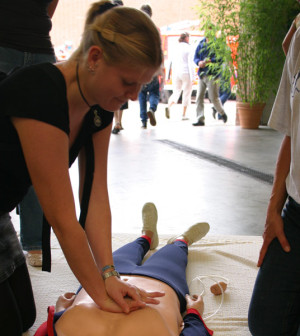- Could Your Grocery Store Meat Be Causing Recurring UTIs?
- Are You Making This Expensive Thermostat Error This Winter?
- Recognizing the Signs of Hypothyroidism
- 10 Strategies to Overcome Insomnia
- Could Artificial Sweeteners Be Aging the Brain Faster?
- Techniques for Soothing Your Nervous System
- Does the Water in Your House Smell Funny? Here’s Why
- Can a Daily Dose of Apple Cider Vinegar Actually Aid Weight Loss?
- 6 Health Beverages That Can Actually Spike Your Blood Sugar
- Treatment Options for Social Anxiety Disorder
Common Irregular Heartbeat May Hamper Seniors’ Walking Ability

Older adults who develop atrial fibrillation, a common heart rhythm irregularity, may be more prone to walking problems — including reduced speed, strength and balance, a new study suggests.
The physical decline associated with atrial fibrillation was equivalent to about four years of aging, the researchers said.
“Atrial fibrillation is a serious disease that can have an important impact on how older adults experience declining physical performance and function with aging,” said lead researcher Dr. Jared Magnani, an assistant professor of medicine at Boston University.
These findings don’t prove a cause-and-effect link between atrial fibrillation and declining physical performance, only that there’s an association, Magnani said.
Other factors can contribute to both the risk of atrial fibrillation and declining physical performance. These factors may include inflammation, increased muscle loss, or being overweight, the researchers said.
The report was released online April 5 in the journal Circulation: Arrhythmia and Electrophysiology.
In atrial fibrillation, the heart’s two upper chambers (atria) beat irregularly and sometimes too fast. This can increase the risk of stroke, heart failure and other conditions.
For the study, Magnani and his colleagues examined the physical performance of more than 2,700 individuals. They were evaluated at ages 70, 74, 78 and 82, then re-evaluated after four years, the study authors said.
Over four years, all participants had a decline in physical performance. But people with atrial fibrillation had a significantly greater decline, the study found.
Specifically, they fared worse on tests of balance, grip strength, how far they could walk in two minutes and the time needed to walk 400 meters — 437 yards. Overall, it took those with atrial fibrillation 20 seconds longer to cover the distance than those without the condition, the researchers said.
“Atrial fibrillation is more than a heart rhythm problem, but seems to be a systemic problem with important consequences in aging,” Magnani said.
When older adults start to slow down or become frail, they have an increased risk of a range of problems, Magnani said. That may result in a fall or fracture. As a result, people may lose their independence, have a decline in quality of life, end up in a long-term care facility, or die, he said.
Atrial fibrillation is among the most common heart rhythm irregularities, said Dr. Gregg Fonarow, professor of cardiology at the University of California, Los Angeles.
The findings in this study “suggest that atrial fibrillation may contribute to age-related declines in physical performance,” said Fonarow, who was not involved with the research. “Identifying effective strategies to prevent and treat atrial fibrillation in older adults are needed,” he said.
The typical treatment for atrial fibrillation is blood thinners to prevent strokes, Magnani said. “This study suggests that exercise and preserving physical performance may also be beneficial for older adults with atrial fibrillation,” he said.
More information
To learn more about atrial fibrillation, visit the American Heart Association.
Source: HealthDay
Copyright © 2026 HealthDay. All rights reserved.










